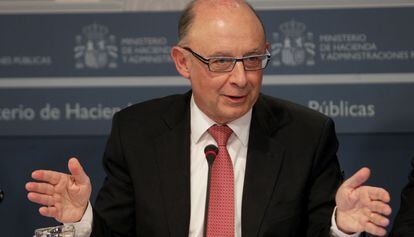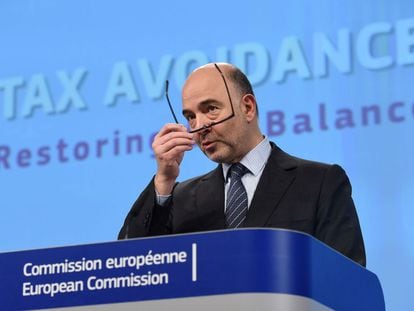Deficit miss signals tough adjustment for Spain’s next government
The 2016 target is 2.8% of GDP, but Madrid will struggle to bring figure down from current 5.2%


News that Spain missed its 2015 public deficit target by nearly a full percentage point means that the next administration will be left with a poisoned chalice, and will struggle to meet Brussels’ demands for spending containment.
Acting Finance Minister Cristóbal Montoro announced on Thursday that Spain’s finances were €56.6 billion in the red last year, representing 5.16% of gross domestic product (GDP).
Spanish authorities had agreed to a 4.2% deficit with Brussels – where experts had nevertheless been expecting to see something closer to 4.8%.
To keep Brussels happy, the minister said that the government will strictly enforce the Budget Stability Law
With the final figure overshooting all forecasts, the acting Popular Party (PP) government is blaming regional governments for going grossly over budget and Montoro says he will put a freeze on their spending ability.
But the scope of the adjustment up ahead – the deficit target for 2016 is 2.8% – means that the next government will probably have to undertake similarly unpopular measures to those introduced four years ago, when the incoming PP administration raised most taxes and slashed public health and education spending.
Compounding the trouble is the fact that Spanish political parties have been in deadlock since the inconclusive general election of December 20, which yielded a hung parliament.
Sign up for our newsletter!
EL PAÍS English Edition is launching a weekly newsletter. Sign up today to receive a selection of our best stories in your inbox every Saturday morning. For full details about how to subscribe, click here.
Attempts at coalition-building have so far proven fruitless, and if no governing deal is struck by May 2, parliament will be dissolved and new elections held on June 26 – all of which would delay any implementation of spending cuts.
On the upside, the Spanish economy is growing this year, compared with its freefall in 2012.
Additionally, part of the 2015 imbalance was caused by one-off costs, including a national health bill for hepatitis C treatment and the discovery of previously undeclared spending by authorities in Catalonia, Valencia and Zaragoza.
A freeze on regional spending
Finance Minister Cristóbal Montoro on Thursday accused the regions of being chiefly responsible for the missed EU target, as they themselves widely overshot their goal of 0.7% of economic output, coming in at 1.66% instead.
To keep Brussels happy, the minister said that the government will strictly enforce the Budget Stability Law, a piece of legislation introduced in late 2012 but partly overlooked for the sake of economic growth and job creation, said Montoro.
The fact that 2015 was an election year at the local, regional and national level also played a role, as governments were reticent to apply spending cuts that would be unpopular with taxpayers.
English version by Susana Urra.












































